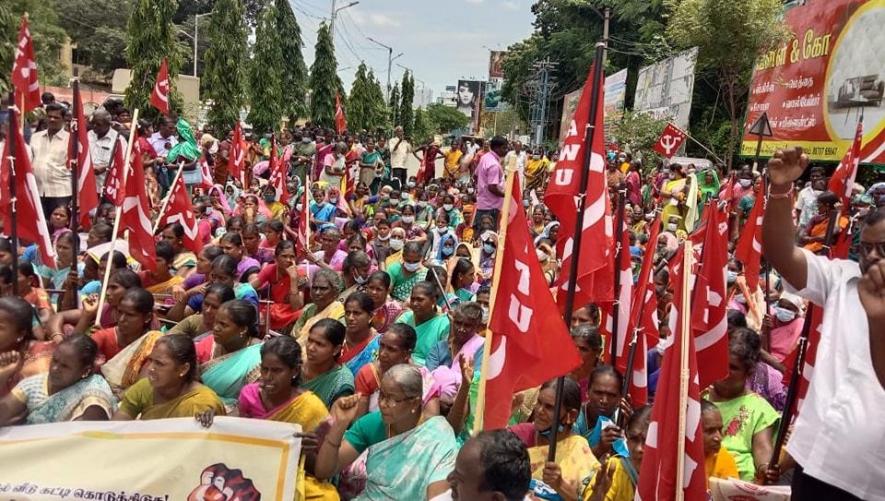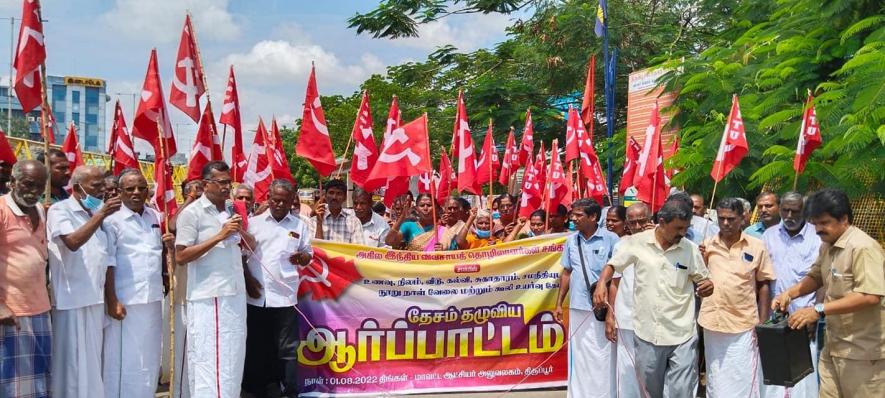
Rural workers protest in Erode. Image courtesy: P Shanmugam
Tamil Nadu: Rural agricultural workers staged demonstrations in front of Collectorates in district headquarters across Tamil Nadu on August 1. It was part of the nationwide call with a 28-point charter of demands, including the right to land, food, work and pension.
In some districts including Kanyakumari and Erode, police denied permission to hold the demonstration in front of the district Collectorates and pressurised the protestors to hold it at alternative locations.
In Tamil Nadu, the protest call was given on behalf of five left-leaning associations including the All India Agriculture Workers Union (AIAWU), All India Kisan Sabha (AIKS) and All India Rural Workers’ Union.
As reported by the organisers, more than 50,000 workers participated in the protest. At the end of the protest, the leaders submitted petitions containing the demands to the District Collectors urging them to be sent to the Prime Minister.
The nationwide protest call was against the Bharatiya Janata Party (BJP) led Central government’s multi-pronged attack on workers, specifically on the rural poor.
Women and Mahatma Gandhi National Rural Employment Guarantee Act (MGNREGA) workers participated in large numbers.
DEMANDS TO STATE GOVT
As part of the protest, agriculture and MGNREGA workers in Tamil Nadu made specific demands from the Dravida Munnetra Kazhagham (DMK)- led state government.
They called for the State government to fix a Minimum Support Price for agricultural produce and to create a separate Welfare Board for farmers. The protestors raised slogans to provide rice and vegetables free of cost through Public Distribution Systems.

Agriculture workers protest in Salem. Image courtesy: CITU Tamil Nadu
The protestors also demanded that public distribution should be strengthened and free grocery packages should be provided like the Left Government in Kerala.
They demanded the State to properly implement the Land Reform Act wherein the surplus land and alienated land should be distributed to the landless poor. They want free house-site pattas to build houses at a cost of Rs five lakh each for people below the poverty line.
Attacks on the downtrodden – tribals, women and minorities – must be stopped immediately, and privatisation of education and healthcare should be abandoned were part of the demands placed.
The protestors demanded the MGNREGA work days be increased from 100 to 200, pay Rs 5,000 as pension for people above the age of 55 and Rs 21,000 as salary to conservancy workers.
In its election manifesto, the DMK promised 150 workdays under the MGNREGA and increase the pay to Rs 300. It also promised that the state government would urge the Centre to extend the scheme to cover municipalities.
OTHER DEMANDS
The overall demands included 300 days of work and a daily wage of Rs 600 for agriculture workers, adequate funds for MGNREGA and paying the dues to workers.

Protest in Tirupur. Image courtesy: CITU, Tamil Nadu
Taking into consideration the recent Wage Commission recommendations, the protestors urged that the daily wages of agricultural labourers should be fixed and implemented in line with the price rise.
The charter of demands also included that all rural workers should be registered with the e-Shram portal- the national database for unorganised workers, and social security schemes should be implemented.
Interest-free loans provided to agricultural labourers through nationalised banks and cooperative banks were also a part of the 28-point demands.
The protestors also urged the union government to immediately withdraw the Goods and Services Tax (GST) tax on essential commodities like rice, wheat, curd etc, and to revoke gas price hikes.
Courtesy: Newsclick